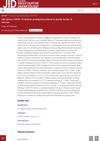 29 citations,
July 2020 in “Journal of The American Academy of Dermatology”
29 citations,
July 2020 in “Journal of The American Academy of Dermatology” Men with severe balding have a higher risk of getting very sick from COVID-19.
 3 citations,
May 2023 in “Frontiers in Public Health”
3 citations,
May 2023 in “Frontiers in Public Health” Most severe COVID-19 patients in Mexico experienced long-lasting symptoms that worsened their quality of life.
[object Object]  6 citations,
September 2020 in “Journal of The American Academy of Dermatology”
6 citations,
September 2020 in “Journal of The American Academy of Dermatology” Severe male balding may increase the risk of serious COVID-19, and treatments that reduce androgens or block a specific enzyme might help protect these individuals.
 5 citations,
October 2022 in “Cureus”
5 citations,
October 2022 in “Cureus” Older, obese people with many COVID-19 symptoms are more likely to suffer from severe long-term COVID-19 effects.
 1 citations,
January 2022 in “Monaldi archives for chest disease”
1 citations,
January 2022 in “Monaldi archives for chest disease” After severe COVID-19, lung damage can improve, detected effectively by lung-ultrasound, and high pressure support during hospitalization can increase lung artery size. Also, about 22% of patients had lung blood clots, and when treated, they recovered faster.
 April 2023 in “Journal of Investigative Dermatology”
April 2023 in “Journal of Investigative Dermatology” People who had severe COVID-19 are more likely to experience hair loss.
 August 2024 in “Journal of Research in Clinical Medicine”
August 2024 in “Journal of Research in Clinical Medicine” COVID-19 can cause various skin issues, with some linked to how severe the illness is.
 2 citations,
October 2020 in “Journal of The American Academy of Dermatology”
2 citations,
October 2020 in “Journal of The American Academy of Dermatology” The authors suggest that scalp hair might protect against COVID-19 and call for more research on scalp health and the virus.
 1 citations,
October 2020 in “Journal of The American Academy of Dermatology”
1 citations,
October 2020 in “Journal of The American Academy of Dermatology” Balding might help identify men at higher risk for severe COVID-19, but more research is needed.
[object Object]  139 citations,
December 2020 in “Cell Stem Cell”
139 citations,
December 2020 in “Cell Stem Cell” Male hormones affect COVID-19 severity and certain drugs targeting these hormones could help reduce the risk.
2 citations,
September 2022 in “Frontiers in Nutrition” High-dose vitamin D3 does not improve symptoms or quality of life in COVID-19 patients after one year.
 49 citations,
January 2021 in “Journal of The European Academy of Dermatology and Venereology”
49 citations,
January 2021 in “Journal of The European Academy of Dermatology and Venereology” Anti-androgens, like finasteride, dutasteride, and spironolactone, may lessen the severity of COVID-19 in men, leading to fewer ICU admissions.
 21 citations,
February 2021 in “BMJ case reports”
21 citations,
February 2021 in “BMJ case reports” Anabolic steroid users may face higher risk of severe COVID-19.

Stem cell therapies, especially adipose-derived ones, show promise for treating severe COVID-19 and related conditions.
1 citations,
March 2022 in “Irish Journal of Medical Science” Men with androgenetic alopecia and hypertension may experience more severe COVID-19.
 June 2023 in “BMC Pharmacology and Toxicology”
June 2023 in “BMC Pharmacology and Toxicology” The trial will test if proxalutamide is safe and effective in reducing death in severe COVID-19 patients.

Many severe COVID-19 patients experienced temporary hair loss, but most regrew hair within six months.
 1 citations,
August 2021 in “Internal Medicine Journal”
1 citations,
August 2021 in “Internal Medicine Journal” After severe COVID-19, 71% of patients experienced excessive hair shedding and thinning within 3 months due to factors like low oxygen levels, medication, stress, and autoimmune disease.
 6 citations,
July 2020 in “Journal of The American Academy of Dermatology”
6 citations,
July 2020 in “Journal of The American Academy of Dermatology” Hair loss link to severe COVID-19 unclear.
October 2021 in “Journal of Investigative Dermatology” No significant link between male pattern baldness and severe Covid-19, but some shared biological pathways exist.
 185 citations,
August 2020 in “Mayo Clinic Proceedings”
185 citations,
August 2020 in “Mayo Clinic Proceedings” Men are more likely to have severe COVID-19 cases and fatalities than women due to factors like lifestyle, aging, and biological differences.
 119 citations,
May 2020 in “Journal of The American Academy of Dermatology”
119 citations,
May 2020 in “Journal of The American Academy of Dermatology” Most COVID-19 patients in hospitals have androgenetic alopecia, more in men, suggesting a link between androgen sensitivity and severe COVID-19 symptoms.
 125 citations,
August 2020 in “Frontiers in Immunology”
125 citations,
August 2020 in “Frontiers in Immunology” Men generally have more severe COVID-19 cases and higher death rates than women due to biological differences.
 29 citations,
October 2020 in “Journal of the European Academy of Dermatology and Venereology”
29 citations,
October 2020 in “Journal of the European Academy of Dermatology and Venereology” Women with high androgen levels may have more severe COVID-19 symptoms.
26 citations,
June 2020 in “The Journal of Allergy and Clinical Immunology In Practice” A patient developed a severe skin reaction and died after taking hydroxychloroquine for COVID-19.
 4 citations,
March 2021 in “Le infezioni in medicina”
4 citations,
March 2021 in “Le infezioni in medicina” Men with hair loss are more likely to experience moderate to severe COVID-19 symptoms.
 3 citations,
September 2021 in “International Journal of Molecular Sciences”
3 citations,
September 2021 in “International Journal of Molecular Sciences” Androgens and a high-fat diet may increase the risk of severe COVID-19 in women with PCOS by upregulating certain proteins in the heart and kidneys.
 April 2023 in “International Journal of Community Medicine and Public Health”
April 2023 in “International Journal of Community Medicine and Public Health” Older people with severe COVID-19, especially those with certain health conditions, are more likely to experience post-COVID syndrome.
 April 2023 in “American Journal of Transplantation”
April 2023 in “American Journal of Transplantation” Hormone replacement therapy may lower the risk of severe COVID-19 outcomes in non-immunosuppressed people and male organ transplant recipients.

Hair loss can happen after both mild and severe COVID-19, and areas with more COVID-19 cases may see more hair loss cases.


























